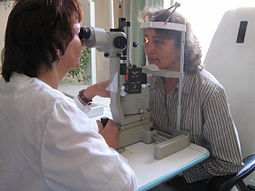Department Introduction

Ophthalmology
 Eye examination with the aid of a slit lamp | |
| System | Eye |
|---|---|
| Significant diseases | Blurred vision, cataract, macular degeneration, glaucoma, diabetic retinopathy |
| Significant tests | Visual field test, ophthalmoscopy |
| Specialist | Ophthalmologist |
| Glossary | Glossary of medicine |
Ophthalmology (/ˌɒfθælˈmɒlədʒi/)[1] is a branch of medicine and surgery which deals with the diagnosis and treatment of eye disorders.[2] An ophthalmologist is a specialist in ophthalmology. The credentials include a degree in medicine, followed by additional four to five years of ophthalmology residency training. Ophthalmology residency training programs may require a one-year pre-residency training in internal medicine, pediatrics, or general surgery. Additional specialty training (or fellowship) may be sought in a particular aspect of eye pathology.[3] Ophthalmologists are allowed to use medications to treat eye diseases, implement laser therapy, and perform surgery when needed.[4] Ophthalmologists may participate in academic research on the diagnosis and treatment for eye disorders.[5]
